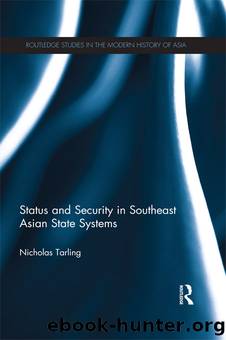Status and Security in Southeast Asian State Systems by Nicholas Tarling

Author:Nicholas Tarling [Tarling, Nicholas]
Language: eng
Format: epub
Tags: History, Asia, India & South Asia, Political Science, International Relations, General, Social Science, Ethnic Studies, Regional Studies
ISBN: 9781136160974
Google: fVV4NDm7lSEC
Publisher: Routledge
Published: 2013-05-07T01:17:45+00:00
6
Independence
The Second World War had made it clearer than ever â especially in Southeast Asia â that a world of empires was to be followed by a world of nation states. The UN and its Charter envisaged that, clearly enunciating the âWestphaliaâ principles, coupled with the Versailles ideals. But the process was complicated by the Cold War between the two super-powers, the US and the SU, that promptly ensued, and it was intensified by the outbreak of the Korean War in 1950. That both promoted the change and qualified it. The two super-powers, as at the end of the First World War, were in agreement that the old empires should come to an end. In some sense, they were, therefore, in accord: they accepted the nation state. Indeed they seldom openly challenged the frontiers of the states that emerged from the colonial states, questionable though they might be. But they did try to influence them, and there they competed. Sometimes they sought the allegiance of the new leadership, offering aid and advice, civil and military. Sometimes they sought to befriend it, sometimes to undermine it, to change its composition or manipulate it, often meeting the kind of difficulties the Japanese had met with their puppets. Sometimes they sought to draw the states into alliances or offer them protection at the risk of also making them targets. In such ways their independence might be modified, even though their sovereignty was nominally respected.
The Cold War entered a second phase in the 1960s. The PRC concluded an alliance with the SU in 1950. After the Korean War both followed a co-existence policy, but by the late 1950s the PRC was adopting a line that increasingly diverged from that of its partner. Mao believed that Khrushchevâs Soviet Union was too ready to compromise with the West. The âCommunist Blocâ fragmented in the 1960s, though never quite disintegrating, and when the US came to terms with the PRC, the Cold War entered a new phase that lasted till the collapse of the SU in 1991.
Chinaâs rhetoric was generally one of struggle. But after the Korean War the super-powers did not come into open or direct conflict. Instead they took part in the conflicts of others, to some extent making them their own, though rarely holding sole responsibility for them. It is a mistake to regard them merely as proxy wars as was often done at the time. Frontiers and sovereignty were acknowledged. But the emphasis was often on the nominal. Subversive movements were urged on by agents, money, and propaganda. Minorities were encouraged to oppose the majorities that now dominated the new nation states. And on the other hand the newly independent governments, seeking aid, sometimes paid the price of what opponents and critics at least called âsatellizationâ or, alternatively, victims of âneo-colonialismâ.
âPuppetsâ was another term of abuse that the super-powers employed to describe the allies of their opponents. Some rulers could rightly be termed puppets, though, like earlier puppets, they were not always easy to control.
Download
This site does not store any files on its server. We only index and link to content provided by other sites. Please contact the content providers to delete copyright contents if any and email us, we'll remove relevant links or contents immediately.
The European Opportunity by Felipe Fernández-Armesto(569)
The European History Highway: A Guide to Internet Resources by Dennis A. Trinkle Scott A. Merriman(535)
Morgan Kaufmann Digital Watermarking and Steganography by Ingemar Cox Matthew Miller Jeffrey Bloom Jessica Fridrich Ton(528)
The Seven Wonders of the Ancient World by Michael Denis Higgins(521)
Hyperculture by Byung-Chul Han(510)
European Security without the Soviet Union by Stuart Croft Phil Williams(507)
European Security in a Global Context by Thierry Tardy(505)
The Routledge companion to Christian ethics by D. Stephen Long Rebekah L. Miles(498)
Get Real with Storytime by Julie Dietzel-Glair & Marianne Crandall Follis(443)
Hudud Al-'Alam 'The Regions of the World' - a Persian Geography 372 A.H. (982 AD) by V. V. Minorsky & C. E. Bosworth(437)
Tibetan Studies in Comparative Perspective by Chih-yu Shih Yu-Wen Chen(435)
Gorbachev And His Generals by William C. Green(429)
Governance, Growth and Global Leadership by Espen Moe(419)
How Languages Are Learned 5th Edition by Patsy M Lightbown;Nina Spada; & Nina Spada(407)
CliffsNotes on Fitzgerald's The Great Gatsby by Kate Maurer(400)
The Oxford History of the World by Fernández-Armesto Felipe;(388)
The Egyptian Economy, 1952-2000 by Khalid Ikram(379)
Oral Poetry and Narratives from Central Arabia: The Poetry of Ad-Dindan : A Bedouin Bard in Southern Najd (Studies in Arabic Literature, Vol 17) (English and Arabic Edition) by P. M. Kupershoek P. Marcel Kurpershoek(365)
The Oxford Handbook of the Incas by Sonia Alconini(365)
